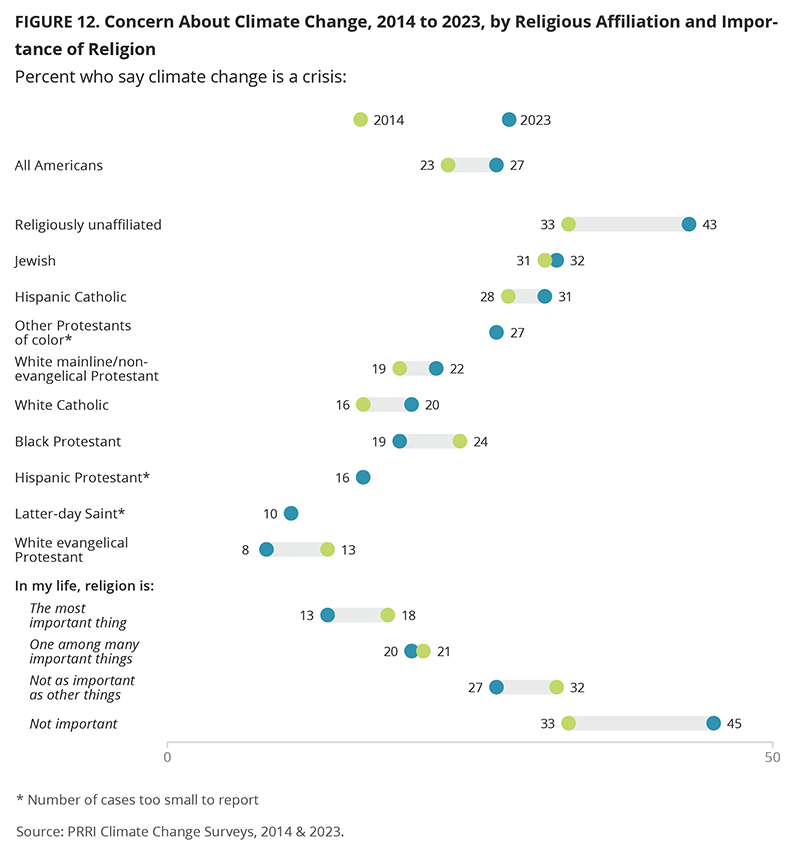(RNS) — The most striking — and disturbing — finding of the Public Religion Research Institute’s new climate change survey is that while the proportion of all Americans who consider climate change a crisis has risen 16% since 2014, among white evangelicals it has dropped 38%.
That brings crisis-level concern among white evangelicals down to 8% — the lowest of any religious community in the country. They are also the only community whose support for action to mitigate climate change falls below 0.5 on a scale of 0 – 1. (Their 0.41 support level compares with 0.57 for all Americans.)
At the other end of the scale are the nones (or, in PRRI lingo, the unaffiliated), among whom crisis concern has risen by nearly a quarter, from 33% to 43%, with support for mitigation action at 0.66.
Black Protestants are the only other religious community whose crisis-level of concern about climate has declined in the past decade (from 24% to 19%). But their support for mitigation action, at 0.61, is above the national average. (It may be that, since 2014, the situation of Black people in American society has edged climate out of the crisis category for some.)
Of course, it’s hardly news that white evangelicals come in last on the scale of faith-based climate concern. Beginning in the 1990s, they were the principal audience for the Interfaith Council for Environmental Stewardship, an outfit funded by the Koch brothers and fossil fuel companies that promoted skepticism about climate change and the science behind it.

“Concern About Climate Change, 2014 to 2023, by Religious Affiliation and Importance of Religion” Graphic courtesy of PRRI
Eventually rechristened the Cornwall Alliance for the Stewardship of Creation, it sponsored the 2000 Cornwall Declaration, which made concerns about global warming out to be unfounded or greatly exaggerated. In 2007, the Southern Baptist Convention followed suit with a resolution that was skeptical about evidence for anthropogenic climate change and opposed to anything that interfered with economic development.
“Unlike secular conservatives, many traditionalist evangelicals receive a double dose of climate skepticism via politically conservative elites and media and from religiously conservative elites and media,” writes Robin Globus Veldman in her fine study of evangelical opposition to climate change action, “The Gospel of Climate Skepticism.” “Coming full circle, many of those religious elites explicitly present politically conservative views as the natural expression of a biblical worldview.”
It’s not as if white evangelicals don’t feel a connection to the natural world. In the PRRI survey, 54% of them said they “feel a deep spiritual connection with nature and the earth most days.” That’s slightly more than the American population as a whole, which weighs in at 52%.
Nor is it necessarily to say that white evangelicals haven’t registered what’s been happening to the climate over the past decade. Where 45% said God won’t let humans destroy the Earth in 2014, now only 35% say so. That’s in line with the population as a whole, where the percentage has dropped from 39% to 28%.
It may be more comforting to look at the 2022 Pew survey on religion and climate, which found that evangelicals were almost evenly divided on the seriousness of climate change, with 34% saying it was an “extremely” or “very serious” problem, 38% that it was “not too serious” or “not a problem.” Also, 32% of them attributed global warming mostly to human activity while just 17% claimed there is “no solid evidence that the earth is getting warmer.”
To be sure, in the 2022 survey Pew did not distinguish white from nonwhite evangelicals — and for the former, PRRI shows the trend line heading in the wrong direction. Perhaps the best news on climate in that regard comes from PRRI’s demographic calculations, which show the white evangelical portion of the U.S. population to have declined 28% since 2014, from 18% to 13%.
In a word, while white evangelicals have become less willing to consider climate change a crisis, there are significantly fewer of them.

